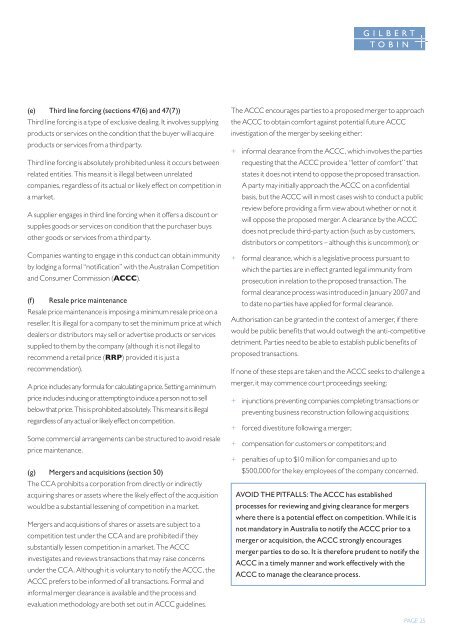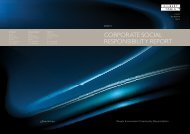Gilbert + tobin - Gilbert and Tobin
Gilbert + tobin - Gilbert and Tobin
Gilbert + tobin - Gilbert and Tobin
Create successful ePaper yourself
Turn your PDF publications into a flip-book with our unique Google optimized e-Paper software.
(e) Third line forcing (sections 47(6) <strong>and</strong> 47(7))<br />
Third line forcing is a type of exclusive dealing. It involves supplying<br />
products or services on the condition that the buyer will acquire<br />
products or services from a third party.<br />
Third line forcing is absolutely prohibited unless it occurs between<br />
related entities. This means it is illegal between unrelated<br />
companies, regardless of its actual or likely effect on competition in<br />
a market.<br />
A supplier engages in third line forcing when it offers a discount or<br />
supplies goods or services on condition that the purchaser buys<br />
other goods or services from a third party.<br />
Companies wanting to engage in this conduct can obtain immunity<br />
by lodging a formal “notification” with the Australian Competition<br />
<strong>and</strong> Consumer Commission (ACCC).<br />
(f) Resale price maintenance<br />
Resale price maintenance is imposing a minimum resale price on a<br />
reseller. It is illegal for a company to set the minimum price at which<br />
dealers or distributors may sell or advertise products or services<br />
supplied to them by the company (although it is not illegal to<br />
recommend a retail price (RRP) provided it is just a<br />
recommendation).<br />
A price includes any formula for calculating a price. Setting a minimum<br />
price includes inducing or attempting to induce a person not to sell<br />
below that price. This is prohibited absolutely. This means it is illegal<br />
regardless of any actual or likely effect on competition.<br />
Some commercial arrangements can be structured to avoid resale<br />
price maintenance.<br />
(g) Mergers <strong>and</strong> acquisitions (section 50)<br />
The CCA prohibits a corporation from directly or indirectly<br />
acquiring shares or assets where the likely effect of the acquisition<br />
would be a substantial lessening of competition in a market.<br />
Mergers <strong>and</strong> acquisitions of shares or assets are subject to a<br />
competition test under the CCA <strong>and</strong> are prohibited if they<br />
substantially lessen competition in a market. The ACCC<br />
investigates <strong>and</strong> reviews transactions that may raise concerns<br />
under the CCA. Although it is voluntary to notify the ACCC, the<br />
ACCC prefers to be informed of all transactions. Formal <strong>and</strong><br />
informal merger clearance is available <strong>and</strong> the process <strong>and</strong><br />
evaluation methodology are both set out in ACCC guidelines.<br />
The ACCC encourages parties to a proposed merger to approach<br />
the ACCC to obtain comfort against potential future ACCC<br />
investigation of the merger by seeking either:<br />
+ + informal clearance from the ACCC, which involves the parties<br />
requesting that the ACCC provide a “letter of comfort” that<br />
states it does not intend to oppose the proposed transaction.<br />
A party may initially approach the ACCC on a confidential<br />
basis, but the ACCC will in most cases wish to conduct a public<br />
review before providing a firm view about whether or not it<br />
will oppose the proposed merger. A clearance by the ACCC<br />
does not preclude third-party action (such as by customers,<br />
distributors or competitors – although this is uncommon); or<br />
+ + formal clearance, which is a legislative process pursuant to<br />
which the parties are in effect granted legal immunity from<br />
prosecution in relation to the proposed transaction. The<br />
formal clearance process was introduced in January 2007 <strong>and</strong><br />
to date no parties have applied for formal clearance.<br />
Authorisation can be granted in the context of a merger, if there<br />
would be public benefits that would outweigh the anti-competitive<br />
detriment. Parties need to be able to establish public benefits of<br />
proposed transactions.<br />
If none of these steps are taken <strong>and</strong> the ACCC seeks to challenge a<br />
merger, it may commence court proceedings seeking:<br />
+ + injunctions preventing companies completing transactions or<br />
preventing business reconstruction following acquisitions;<br />
+ + forced divestiture following a merger;<br />
+ + compensation for customers or competitors; <strong>and</strong><br />
+ + penalties of up to $10 million for companies <strong>and</strong> up to<br />
$500,000 for the key employees of the company concerned.<br />
Avoid the pitfalls: The ACCC has established<br />
processes for reviewing <strong>and</strong> giving clearance for mergers<br />
where there is a potential effect on competition. While it is<br />
not m<strong>and</strong>atory in Australia to notify the ACCC prior to a<br />
merger or acquisition, the ACCC strongly encourages<br />
merger parties to do so. It is therefore prudent to notify the<br />
ACCC in a timely manner <strong>and</strong> work effectively with the<br />
ACCC to manage the clearance process.<br />
PAGE 25







